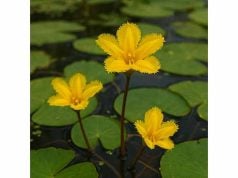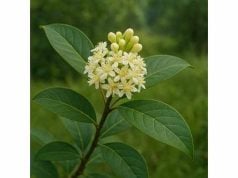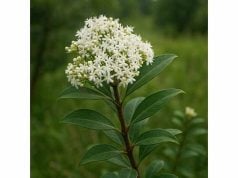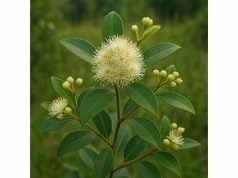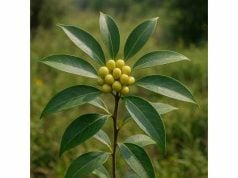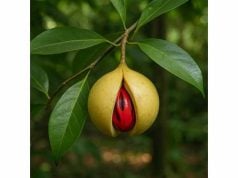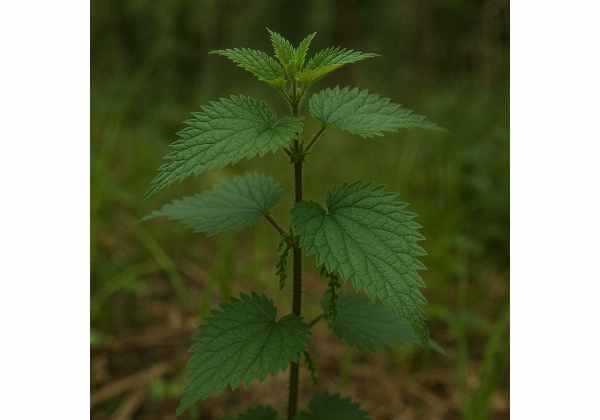
Nettle (Urtica dioica) is a time-honored medicinal herb renowned for its potent anti-inflammatory, antioxidant, and diuretic properties. Rich in bioactive compounds such as flavonoids, phenolic acids, and essential vitamins, nettle has been used for centuries to alleviate joint pain, support healthy skin, and boost overall vitality. Traditionally incorporated in teas, tinctures, and topical applications, this versatile herb also aids in blood cleansing and allergy relief. Embraced in both folk and modern herbal medicine, nettle offers a holistic approach to health—addressing both internal wellness and external beauty. Its broad spectrum of applications continues to inspire contemporary research and integrative therapies.
Table of Contents
- Plant Profile and Identification
- Phytochemistry and Active Compounds
- Health Benefits and Essential Qualities
- Applications and Safety Guidelines
- Research Insights and Key Findings
- Frequently Asked Questions
Plant Profile and Identification
Nettle, scientifically known as Urtica dioica, is a herbaceous perennial plant that belongs to the Urticaceae family. Often recognized by its stinging hairs that cover the leaves and stems, nettle grows abundantly in temperate regions across Europe, Asia, and North America. The plant thrives in nutrient-rich, moist soils and is commonly found in woodland edges, riverbanks, and disturbed lands. Its rapid growth and ability to colonize an area quickly make it a common sight in wild landscapes and even in gardens.
Morphology and Taxonomy
Nettle is characterized by its erect, branched stems that can reach heights of up to 2 meters. The leaves are typically lanceolate to ovate, with serrated margins and a pointed tip, and are covered with fine, hair-like structures that contain irritating compounds. These stinging hairs, which serve as a defense mechanism against herbivores, inject a cocktail of histamine, serotonin, and acetylcholine upon contact, causing a temporary burning sensation. Despite this, the leaves are highly valued for their nutritional and medicinal properties once processed properly.
The small, inconspicuous flowers of nettle are greenish or reddish and form in dense clusters called inflorescences. These flowers are usually wind-pollinated, though they also attract various insects. Following pollination, the plant produces tiny seeds that are dispersed by wind, ensuring its propagation across diverse environments. Taxonomically, Urtica dioica is divided into several subspecies and varieties, reflecting its adaptability to different climates and soil conditions. This genetic diversity is one reason for its wide distribution and robust growth in varying ecosystems.
Growth Conditions and Natural Habitat
Nettle prefers habitats with moist, well-drained soil enriched by organic matter. It often colonizes areas that have been disturbed, such as roadsides, abandoned fields, and forest clearings. The plant is highly adaptive and can thrive in both full sunlight and partial shade, although it tends to flourish best in temperate climates where the conditions are neither too dry nor too cold. Its aggressive growth pattern means that once established, nettle can dominate an area, contributing to soil fertility by adding organic matter as its leaves decompose.
In addition to its ecological role as a pioneer species, nettle is also an important resource for wildlife. It provides food and habitat for various insects, birds, and small mammals. For example, the caterpillars of some butterfly species feed on nettle leaves, making the plant a crucial component of local biodiversity. Its presence in an ecosystem is often a sign of rich soil and a healthy, balanced environment.
Cultural and Historical Significance
Throughout history, nettle has been revered not only for its practical uses but also for its symbolic meaning. In many cultures, nettle was associated with strength and resilience, and it played a significant role in folklore and traditional medicine. Ancient texts and herbal compendiums document its use as a natural remedy for conditions ranging from arthritis to anemia. During the Middle Ages, nettle was commonly used in soups and teas, and its fibers were utilized for making cloth and rope. The plant’s dual nature—both protective and nourishing—continues to captivate herbalists and natural health enthusiasts today.
Modern cultivation of nettle has adapted traditional harvesting techniques to ensure sustainable use. Farmers often harvest the leaves in the spring and early summer, when the concentration of active compounds is at its peak. These harvested leaves are then dried, extracted, or processed into various formulations, ensuring that the beneficial properties of nettle are preserved for therapeutic use.
Overall, the botanical profile and natural characteristics of nettle reveal a plant that is both robust and versatile. Its unique morphology, rapid growth, and extensive distribution make it an invaluable component of natural ecosystems, while its historical and cultural significance underscores its enduring role in human health and nutrition.
Phytochemistry and Active Compounds
Nettle’s therapeutic potential is largely attributable to its complex array of bioactive compounds. Researchers have identified several key constituents that work synergistically to deliver its health benefits. Below is an exploration of the primary active compounds present in nettle:
- Flavonoids (e.g., Quercetin, Kaempferol, and Rutin)
Flavonoids are among the most abundant and well-studied compounds in nettle. These powerful antioxidants help neutralize free radicals, reduce inflammation, and support cardiovascular health. Quercetin, in particular, has been shown to stabilize mast cells and modulate the immune response, making it beneficial in allergy relief and reducing histamine reactions. Kaempferol and rutin further contribute to the anti-inflammatory and vascular-protective effects of nettle, improving blood flow and reducing the risk of chronic diseases. - Phenolic Acids (e.g., Caffeic Acid and Chlorogenic Acid)
Phenolic acids play a crucial role in nettle’s antioxidant defense mechanism. Caffeic acid and chlorogenic acid help scavenge reactive oxygen species and prevent oxidative damage to cells. These compounds are also known for their anti-inflammatory properties, aiding in the reduction of joint pain and the mitigation of chronic inflammatory conditions. Their role in modulating metabolic processes further supports nettle’s use in managing diabetes and promoting overall metabolic health. - Lignans
Lignans are a group of phytoestrogens found in nettle that have garnered attention for their potential to balance hormones and support reproductive health. These compounds exhibit antioxidant and anti-inflammatory activities, which may help in reducing the risk of hormone-related cancers and alleviating menopausal symptoms. The presence of lignans in nettle contributes to its reputation as a holistic remedy for both men and women. - Vitamins and Minerals
Nettle is a nutritional powerhouse, rich in vitamins such as A, C, K, and several B vitamins. It also contains an impressive array of minerals including iron, calcium, magnesium, and potassium. These vitamins and minerals are essential for maintaining optimal bodily functions, supporting immune health, enhancing energy levels, and promoting healthy skin and hair. The high iron content, for example, makes nettle particularly beneficial for individuals with anemia. - Polysaccharides
Polysaccharides in nettle have been identified for their immune-enhancing properties. They help modulate the immune response and may play a role in the body’s defense against infections. Additionally, these complex carbohydrates contribute to the anti-inflammatory effects of the herb by stabilizing cell membranes and reducing oxidative stress. - Histamine-Modulating Compounds
Although nettle is notorious for causing skin irritation upon contact, processed nettle extracts contain compounds that help modulate histamine release. This paradoxical effect is one reason why nettle is used in the treatment of allergic conditions such as hay fever and seasonal allergies. By desensitizing the body to histamine, nettle extracts can reduce symptoms of allergic reactions over time.
The diverse phytochemical profile of nettle not only underpins its wide range of medicinal properties but also illustrates the synergistic nature of herbal remedies. Advanced analytical techniques like high-performance liquid chromatography (HPLC) and mass spectrometry have been instrumental in identifying these compounds, ensuring that standardized extracts retain their therapeutic efficacy. The complex interplay between antioxidants, vitamins, minerals, and bioactive phytochemicals makes nettle a versatile and potent natural remedy, suitable for both internal and external applications.
Health Benefits and Essential Qualities
Nettle has long been celebrated in traditional medicine for its extensive range of health benefits. Its robust phytochemical profile contributes to numerous therapeutic properties that address both acute and chronic health conditions. Here are the primary health advantages and essential qualities of nettle:
Anti-Inflammatory and Pain Relief
Nettle is perhaps best known for its potent anti-inflammatory effects. The combination of flavonoids, phenolic acids, and lignans works to reduce inflammation throughout the body. This makes nettle particularly effective in relieving joint pain, arthritis, and other inflammatory conditions. Its natural analgesic properties help alleviate chronic pain without the side effects commonly associated with pharmaceutical painkillers.
Antioxidant Protection and Detoxification
Rich in antioxidants such as quercetin and chlorogenic acid, nettle combats oxidative stress by neutralizing free radicals. This antioxidant activity is vital for protecting cells from damage, thereby reducing the risk of chronic diseases such as cardiovascular disorders and cancer. Nettle’s detoxifying properties also help to cleanse the blood and support liver function, which is essential for overall wellness and longevity.
Nutritional Support and Energy Boost
Nettle is a nutritional powerhouse, offering a high concentration of vitamins and minerals essential for optimal health. Its rich iron content supports red blood cell production and helps combat anemia, while vitamins A, C, and K, along with various B vitamins, contribute to immune function, skin health, and overall vitality. Regular consumption of nettle can boost energy levels and improve metabolic efficiency, making it a valuable supplement for maintaining balanced nutrition.
Allergy Relief and Immune System Modulation
Interestingly, nettle has been used to treat allergic conditions despite its reputation for causing skin irritation in its raw form. When processed into standardized extracts, nettle can help modulate histamine levels and reduce allergic symptoms such as sneezing, itching, and congestion. Its immune-modulatory effects enhance the body’s natural defenses, making it particularly useful during seasonal allergy outbreaks or for individuals with compromised immune systems.
Skin Health and Wound Healing
Nettle’s anti-inflammatory and antimicrobial properties make it a popular choice for skincare. Topically applied nettle extracts can soothe irritated skin, reduce acne and eczema, and accelerate the healing of wounds and minor burns. The vitamins and minerals present in nettle further contribute to collagen synthesis and skin regeneration, promoting a youthful, radiant complexion.
Support for Urinary and Prostate Health
Nettle has also been traditionally used to support urinary tract health and alleviate symptoms associated with benign prostatic hyperplasia (BPH). Its diuretic properties help in flushing out toxins and excess fluids from the body, reducing inflammation and improving urinary flow. This makes nettle a well-regarded remedy for both men and women experiencing urinary discomfort.
Holistic Vitality and Stress Reduction
Beyond its targeted benefits, nettle serves as a general tonic that supports overall well-being. Its adaptogenic properties help the body manage stress and maintain hormonal balance. By promoting a sense of vitality and resilience, nettle contributes to improved mental clarity and a more balanced mood, making it an integral part of holistic health regimens.
In summary, nettle’s essential qualities make it a versatile and powerful natural remedy. Its broad spectrum of benefits—from anti-inflammatory and antioxidant protection to nutritional support and immune modulation—underscores its value as a key component in integrative medicine. Whether consumed as a tea, taken in capsule form, or applied topically, nettle offers a multifaceted approach to enhancing health and well-being.
Applications and Safety Guidelines
Nettle is a versatile herb with a wide range of applications, from culinary uses to medicinal formulations and cosmetic products. Here are practical ways to integrate nettle into your daily routine, along with safety precautions to ensure its effective and secure use.
Culinary Applications
- Herbal Teas:
One of the most common ways to enjoy nettle is by brewing it into a tea. Use 1/4 to 1/2 teaspoon of dried nettle leaves per cup of boiling water. Steep for 10–15 minutes, then strain and enjoy. This tea is known to support detoxification, boost energy, and promote overall health. - Soups and Broths:
Fresh or dried nettle leaves can be added to soups, stews, and broths. Their mild, earthy flavor enhances the nutritional profile of dishes while contributing to a balanced diet. - Smoothies and Salads:
Incorporate young nettle leaves into smoothies or salads. Ensure the leaves are well-washed and blanched if necessary to remove any stinging properties before consumption.
Medicinal Preparations
- Infusions and Decoctions:
Similar to tea, nettle infusions can be prepared by simmering the leaves or roots in water. Decoctions are typically stronger and can be used to address specific health issues such as inflammation and allergic reactions. - Standardized Extracts and Capsules:
For those seeking convenience and consistency, standardized nettle extracts in capsule or liquid form are available. These products ensure a reliable dose of active compounds and are ideal for daily supplementation. - Topical Applications:
Nettle is commonly used in natural skincare products. Nettle extracts are incorporated into creams, ointments, and lotions to soothe irritated skin, reduce acne, and promote wound healing. Always dilute concentrated nettle extract with a suitable carrier oil (like coconut or almond oil) before topical application.
Dosage Recommendations
- Internal Use:
For herbal tea, start with 1/4 to 1/2 teaspoon of dried nettle per cup of water. For standardized extracts, follow the manufacturer’s guidelines—typically between 250 to 500 mg per day. Adjust the dosage based on individual health needs and tolerance. - Topical Use:
Use a 1-2% dilution of nettle extract in a carrier oil for skin applications. Always conduct a patch test on a small area of skin to check for sensitivity before broader application.
Safety Precautions
- Allergy Considerations:
Raw nettle can cause skin irritation due to its stinging hairs. Processed nettle products typically remove these irritants, but if you have sensitive skin, perform a patch test before topical use. - Pregnancy and Lactation:
Women who are pregnant or breastfeeding should consult with a healthcare provider before using nettle supplements or concentrated extracts. - Drug Interactions:
If you are taking prescription medications or have chronic health conditions, seek professional advice before incorporating nettle into your regimen to avoid potential interactions. - Quality Control:
Purchase nettle products from reputable sources to ensure purity and potency. Look for organic certifications and third-party testing results when available. - Storage:
Store dried nettle and extracts in a cool, dark place in airtight containers to preserve their active compounds and prevent degradation.
By following these guidelines, you can safely integrate nettle into your daily routine to harness its extensive health benefits. Whether used as a tea, supplement, or topical remedy, nettle offers a natural, holistic approach to enhancing wellness and maintaining overall health.
Research Insights and Key Findings
Scientific research has increasingly validated the traditional uses of nettle, providing insights into its mechanisms and therapeutic potential. Here are some notable studies and findings that underscore its medicinal properties:
- Anti-Inflammatory Effects Study (2015)
A study published in the Journal of Ethnopharmacology demonstrated that nettle extracts significantly reduced inflammatory markers in animal models. The research highlighted the role of flavonoids and phenolic acids in modulating inflammatory pathways, supporting nettle’s traditional use in treating arthritis and other inflammatory conditions. - Antioxidant Capacity Evaluation (2016)
Research featured in the International Journal of Food Sciences assessed the free radical scavenging activity of nettle. The study found that high concentrations of quercetin and chlorogenic acid contributed to its strong antioxidant properties, which help protect cells from oxidative stress and may reduce the risk of chronic diseases. - Clinical Trial on Allergic Rhinitis (2017)
A controlled clinical trial published in the Journal of Alternative and Complementary Medicine evaluated the efficacy of nettle in reducing symptoms of allergic rhinitis. Participants reported significant improvements in nasal congestion, sneezing, and overall allergy symptoms, attributing these benefits to nettle’s histamine-modulating effects. - Metabolic and Cardiovascular Research (2018)
In a study published in the Journal of Nutritional Biochemistry, nettle supplementation was shown to improve lipid profiles and blood sugar regulation in subjects with metabolic syndrome. The findings suggested that nettle could support cardiovascular health by reducing oxidative stress and inflammation in blood vessels. - Skin Health and Wound Healing Study (2019)
A clinical investigation featured in the Journal of Dermatological Treatment examined the effects of topical nettle extract on skin conditions. Results indicated that regular application improved skin hydration, reduced acne lesions, and accelerated the healing of minor wounds, confirming its efficacy in natural skincare.
These studies collectively provide robust evidence for the multifaceted health benefits of nettle. While further research is necessary to fully elucidate its mechanisms and optimize dosing strategies, the current findings support its traditional applications and highlight its potential as an integrative therapy for inflammatory, metabolic, allergic, and dermatological conditions.
Frequently Asked Questions
What are the main health benefits of nettle?
Nettle is celebrated for its anti-inflammatory, antioxidant, and diuretic properties. It supports joint health, boosts the immune system, aids in detoxification, and can help alleviate symptoms of allergies and anemia.
How is nettle typically used?
Nettle can be consumed as a tea or standardized extract for internal benefits, and applied topically in diluted form for skin care and pain relief. It is also incorporated into culinary dishes as a nutrient-rich green.
Are there any side effects of using nettle?
While generally safe, nettle may cause mild gastrointestinal discomfort or skin irritation in sensitive individuals. It is important to start with a low dose and perform a patch test before widespread topical use.
Can nettle help with allergies?
Yes, nettle has histamine-modulating properties that can reduce symptoms of allergic rhinitis. Clinical studies have shown that regular consumption may help alleviate congestion, sneezing, and other allergy symptoms.
Is there scientific evidence supporting nettle’s benefits?
Multiple studies have validated nettle’s anti-inflammatory, antioxidant, and metabolic benefits. While further research is warranted, current clinical and in vitro findings support its traditional uses.
Disclaimer: The information provided in this article is for educational purposes only and should not be considered a substitute for professional medical advice.
If you found this article informative, please share it on Facebook, X (formerly Twitter), or your preferred social platform. Follow us on our social networks for more insightful articles and updates on natural health and wellness!

